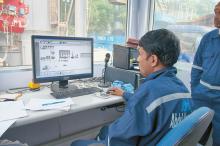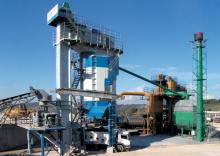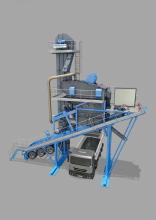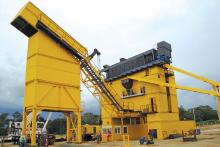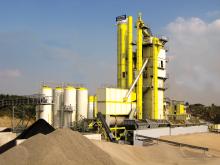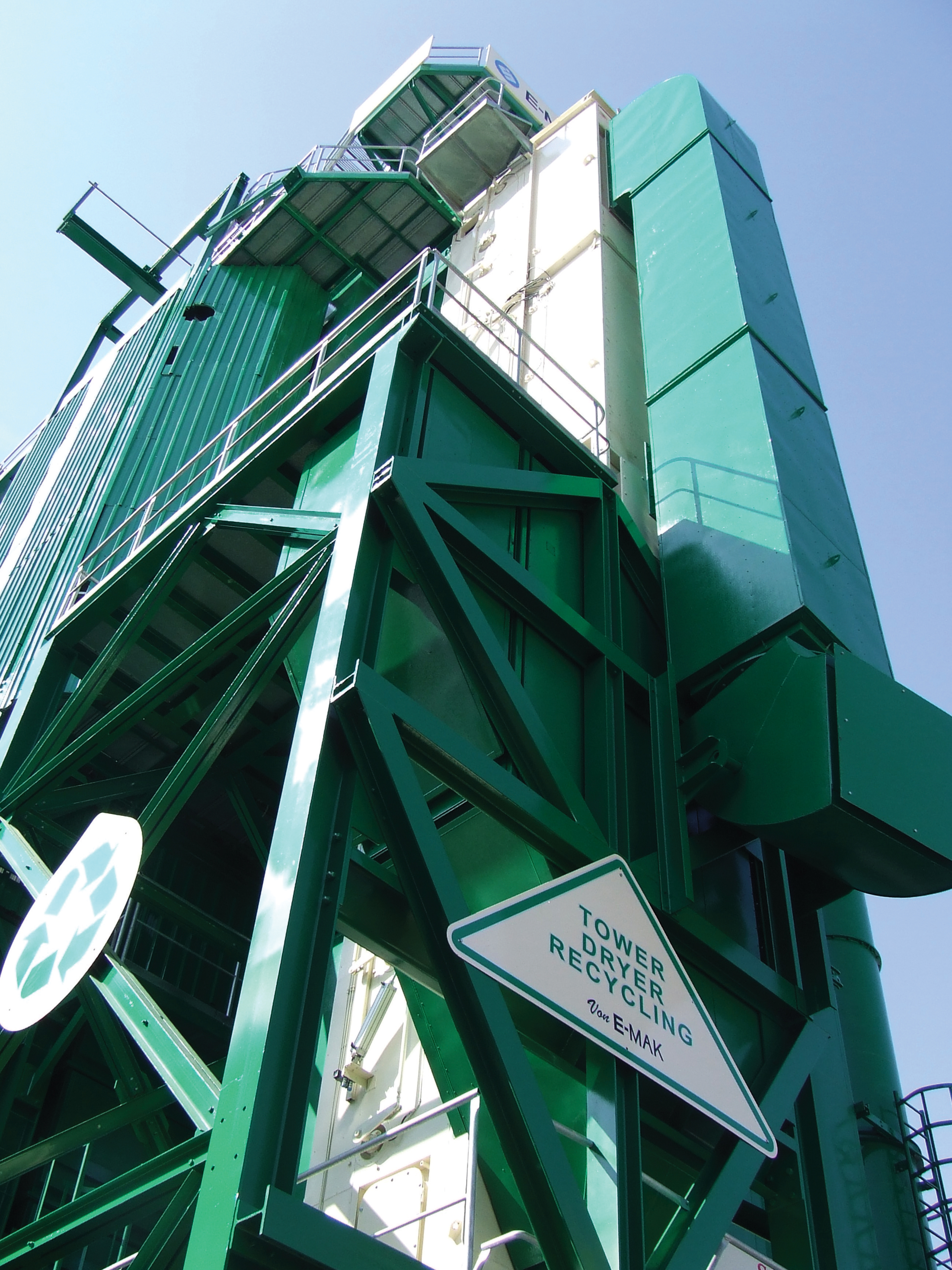
Energy efficiency and recycling are understandably becoming increasingly important to asphalt plants manufacturers and their customers as Patrick Smith reports.
New mixes, such as warm-mix asphalt; special additives and innovative plant designs are all contributing to reducing costs while producing high quality asphalt.
As if to illustrate the point, Turkish asphalt and machinery producer
E-Mak currently owns global patent rights for Super GT technology, which is said to help reduce fuel consumption by 40% and carbon emissions by 50%.
The plant was transported to 2013
Super GT is currently used in 20 places in Turkey and will be exported to a number of countries around the world.
The E-Mak plant is a prototype and is still being developed, with indirect heating to ensure that the bitumen is not damaged during the recycling process.
It uses heat generated by the burner and this hot air flows through the tower.
The reclaimed asphalt pavement (RAP) elevator carries the material to a bin with a special valve underneath that then controls the feed quantity. Specially designed flights inside the tower increase the time that the material takes to descend so as to increase heat absorption. This provides additional mixing with the internal layout also minimising the risk of material sticking. As it passes through the tower the RAP is heated to 120°C and is then mixed with the fresh aggregate, which is heated to 180°C and fed through the dryer drum.
The machine can produce 80tonnes/hour of high quality asphalt and with a feed input of 35-40% RAP. The company has high hopes for this unit and believes it will allow efficient production of high quality asphalt using recycled materials.
German company
“In order to save valuable resources we have developed a special machine that can handle big lumps of recycling material which then separates it back into its own original structure,” says Bernd Benninghoven, managing director of German company Benninghoven, which has developed and is trialling a new system for recycling.
“This then allows you to add as much recycling as possible which is important. It is basically not a crushing effect, it is a separation effect. This is achieved by a two-line crusher system or granulator.” The system, says Benninghoven, allows the inclusion of an extremely high content of recycled material in an asphalt plant mix as the recycled material is of a superior quality.
“We listened to the demands of customers and have made some developments on it, especially the capacity and separation. The first trials have been very positive.”
Ammann’s Prime 140 is the latest addition to the company’s successful continuous asphalt mixing plants.
Highly mobile and compact, the Prime 140 produces high-quality asphalt thanks to the clear separation of the drying and mixing processes. Reclaimed asphalt and fibres can be added far away from the heat source.
All continuous asphalt mixing plants from Ammann are equipped with a continuously running two-shaft paddle mixer and the Prime 140 is no exception. One of its special features is a controllable outlet gate that enables the filling height and, therefore, the mixing time to be set depending on recipe and output.
The outlet gate also drastically reduces losses during plant relocation and commissioning/decommissioning.
The A140 is capable of output levels of 140tonnes/hour and features an Amix two-shaft paddle mixer and the Ammann AS1 control system.
Another newcomer from Ammann is the Easy Batch 140 asphalt mixing plant, which is designed specifically for top mobility, and which also has an output of 140tonnes/hour.
The completely autonomous asphalt mixing plant produces quality asphalt and is specifically designed to provide products to larger construction sites with the flexibility of fast recipe changes.
It comes pre-assembled on two trailers and can be set up without a crane, being designed for regions with little developed infrastructure to produce asphalt reliably and independently.A variety of extension options are also available, including a five-fold screening function as well as a RAP feed via an RAH 50 drum.
US company
According to Ben Brock, Astec Industries group vice president for asphalt, the decision to consolidate the manufacturing of the corporation’s hot mix asphalt plants creates the ability to offer a broader range of plants and technology designs under the Astec brand.
“The addition of the small asphalt plant product line from CEI is a significant extension to the current offerings from Astec,” says Brock.
“This allows Astec to immediately market one of the most extensive offerings in the industry with a range of plants from 72tonnes/hour to 453tonnes/hour.
“The plant production requirements throughout the world are considerably lower than in North America, making the addition of the Nomad line a key asset to the plant offerings for Astec.”
The Nomad Series with production ratings of 72, 117 and 158tonnes/hour is said to be a highly portable plant “with simplicity in mind.”
The Nomad plant can be erected in less than a day, and since its inception many options have been developed.
Astec is also combining the technologies of the Astec Global series and the Rap King, previously offered by CEI, to showcase a portable hot mix plant with high RAP capabilities.
The series will comprise 163 and 200tonnes/hour plants.
“With a focused design on quality hot mix production and ultra-portability, the Global series rounds out the Double Barrel line-up.” Meanwhile, new releases from
“Due to its flexibility, the system is not only available for new plants but is specially qualified for the retrofitting of existing asphalt mixing plants,” says the company.
Lintec has also produced two new fully-containerised asphalt mixing plants, the new CSD 1510 with integrated hot storage and the CSM 2500 with integrated hot/cold recycling system.
The units benefit from features used in the Top Tower range such as the drying/filtering tower system. This features an innovative location for the filter and under-filter hopper, above the dryer drum, which is said to help reduce energy consumption. The modular plant can be supplied in a basic version, while modules can be added as required in a similar fashion to the Top Tower models.
For ease of transport the units are just 2.5m wide, allowing them to be shifted on roads in Europe as standard loads.
The design of the heating system optimises the gas circuit and unlike conventional systems, the duct between the dryer and filter is short and insulated, which minimises energy loss, says Marini.
Recovery fines are collected in the under-filter hopper by gravity and then conveyed to the fines weighing hopper either directly by screw or by a fines elevator. The bigger fines collected in the pre-separator are conveyed by gravity to the inlet of the hot elevator, innovations that eliminate the need for many screw conveyors and therefore result in “considerable savings both in terms of power consumption and maintenance costs.”
Energy given off by the dryer is captured by the under-filter hopper and released by the dryer drum to keep the recovered fines in a hot atmosphere.
The eTOWER is also fitted with a new-generation screen designed with ergonomics and safety in mind.
Marini says that the eTOWER can use all modern recycling systems, with two systems for introducing RAP: a recycling ring and direct introduction in the mixer via a specific elevator.
Their combined use means that recycling rates of nearly 50% can be achieved, and for higher recycling rates the plant can be equipped with an additional parallel dryer drum for RAP, says Marini.
Warm-mix asphalt production, whether involving the injection of liquid or solid additives, foam bitumen generation or specific introduction cycles of materials, is also offered.
The eTOWER 2500 is fitted with the AQUABlack foam bitumen production system, so the final asphalt temperature can be cut by more than 30°C.
For customers facing problems with a lack of infrastructure, Turkish company Çesan has designed its new flagship product, the King Batch 280 stationary plant, which can produce 280tonnes/hour. It has a compact design, which allows it to be transported anywhere in the world in as few as eight containers, significantly reducing transport costs.
Çesan has also designed a mechanical base for the plant and this allows it to be constructed on any surface. Until now many asphalt plants have been constructed on purpose-built concrete slabs. However, the King Batch 280 can be situated on any compacted surface.
Çesan says it expects interest from most markets but particularly the Middle East and Africa.

